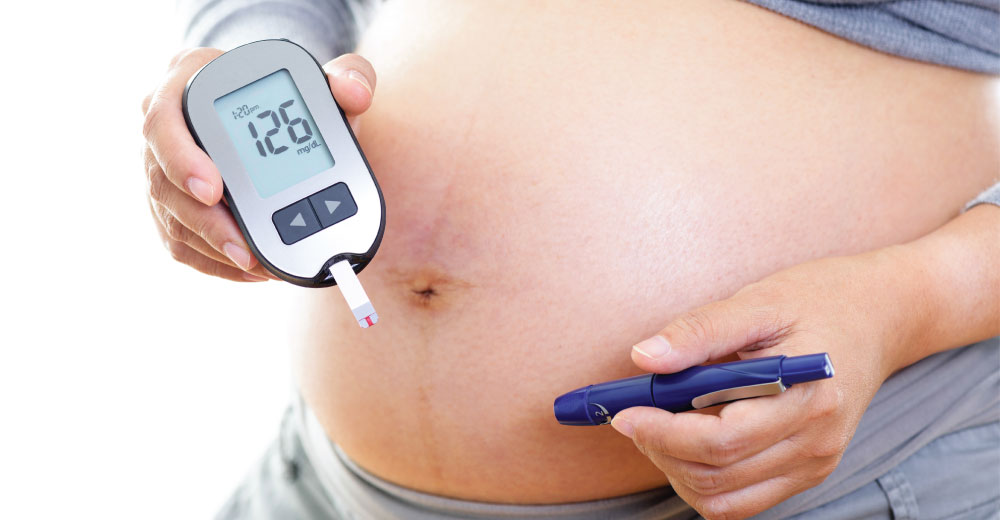Research states that gestational diabetes is high blood sugar (glucose) that develops during pregnancy and usually disappears after giving birth. Diabetes can cause problems during pregnancy for women and their developing babies. Poor control of diabetes during pregnancy increases the chances for birth defects and other problems for the pregnancy. Proper health care before and during pregnancy can help prevent birth defects and other health problems. But the risk can be reduced if the condition is detected early and well managed.
Diabetes Mellitus and Pregnancy
Gestational diabetes is a type of diabetes that is first seen in a pregnant woman who did not have diabetes before she was pregnant. Gestational diabetes usually shows up in the middle of pregnancy.
Q: What is diabetes in pregnancy, also known as gestational diabetes mellitus (GDM)?
Dr. Prakash: Diabetes that develops during pregnancy is known as gestational diabetes. It occurs because the body cannot produce enough insulin which is a hormone important in controlling blood glucose to meet its extra needs in pregnancy. This results in high blood glucose levels. Gestational diabetes usually starts in the middle or towards the end of pregnancy.
Q: What causes diabetes during pregnancy, and can it be prevented?
Dr. Prakash: During pregnancy, a woman’s body undergoes hormonal changes and physical changes such as weight gain. Because of these changes, the body’s cells don’t use insulin well, a condition called insulin resistance. All pregnant women have some insulin resistance during late pregnancy. Most pregnant women can produce enough insulin to overcome insulin resistance, but some cannot. These women develop gestational diabetes. As for prevention, before embarking on a pregnancy, if a woman is overweight, losing weight with regular physical activities may help in preventing gestational diabetes.
Q: What are the possible symptoms of diabetes during pregnancy?
Dr. Prakash: Usually, gestational diabetes has no symptoms. If a woman does have symptoms, they may be mild, such as being thirstier than normal or having to urinate more often.
Q: What age group or category of women can be affected by this type of diabetes?
Dr. Prakash: A woman is more likely to develop gestational diabetes if she is overweight with a BMI of 27kg/m2 or higher, previously have had Gestational diabetes, has a history of giving birth to a large baby, have a first-degree family member with diabetes or with the presence of sugars in the urine test done during routine follow up.
Q: How can pre-existing diabetes be managed in a pregnant woman?
Dr. Prakash: Assessment of sugar levels in a pregnant woman with pre-existing diabetes is vital. Women already on medication, would either be advised to continue current medication or they may need to start on insulin injections. Low dose aspirin will also be given in addition to folic acid, calcium carbonate and Vit D3 tablets. Additional blood tests to look at kidney functions would need to be done. An appointment for eye assessment by an ophthalmologist will be organized to look for eye-related complications secondary to pre-existing diabetes. The woman will also be given a consultation with the dietician for relevant advice in maintaining a healthy diet. Her pregnancy follow-ups would further be under combined care with the endocrinologist.
Q: Is it necessary for pregnant women to be screened for GDM?
Dr. Prakash: All pregnant women with risk factors will need to be screened for GDM. Women at risk of developing GDM will be advised to screen early in pregnancy. Women aged 25 and above with no risk factors will be advised screening between 24 to 28 weeks of gestation.
Q: What is the treatment for GDM in pregnancy, and how is it managed?
Dr. Prakash: In some women, GDM will respond to a healthy diet and exercise. The majority will need oral medication or insulin. Follow-ups with the obstetrician will be on a regular basis. The woman will be advised to monitor her blood sugar levels frequently and any abnormal results will require immediate attention by the obstetrician.
Q: What are the likely complications of diabetes during pregnancy?
Dr. Prakash: Most women who develop gestational diabetes have healthy pregnancies and healthy babies but occasionally gestational diabetes can cause serious problems, especially if it is not recognized or treated. With gestational diabetes, a woman is more likely to develop a condition called preeclampsia, which is when you develop high blood pressure and too much protein in her urine during the second half of pregnancy. Uncontrolled sugar levels can also result in a woman having a stillbirth. In terms of delivery, gestational diabetes may also increase your chance of having a cesarean section as your baby may be large. In the long term, the chance of developing type 2 diabetes later in life is also increased.
Q: How will gestational diabetes impact the baby’s development, and are there any birth defects?
Dr. Prakash: Most developmental anomalies or birth defects are seen in women with pregestational diabetes in pregnancy. The anomalies include problems with the development of the heart, central nervous and skeletal system. These anomalies are usually a result of poorly controlled diabetes during preconception up to the first trimester.
Q: How prevalent is diabetes in pregnancy in Malaysia?
Dr. Prakash: The prevalence of diabetes in pregnancy in Malaysia is quite common ranging from 18% to 24%. The global rapid increase of gestational diabetes mellitus is alarming. Diabetes can be a common endocrine disorder in pregnancy, which is detected in weeks 24 to 28. On certain occasions, the condition can develop earlier as well. Being diagnosed with gestational diabetes can be disturbing emotionally in pregnancy, but with early screening and detection, the condition can be well managed to avoid any complications during pregnancy and delivery. The prevalence of diabetes has been associated with lifestyle changes, environment and increasing urbanization. Lifestyle and eating routines play an important role in keeping your blood sugar levels within a healthy range.

Consultant Obstetrician & Gynaecologist,
Sri Kota Specialist Medical Centre, Klang


